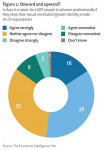Lack of proper oversight puts many corporate IT modernisation efforts at risk, finds new study
Companies complying with Sarbanes-Oxley (SOX) in the US, for example, find it challenging to implement unplanned modernisation projects. The uncertainty as to who should lead the project – IT or business – often results in onerous workflows that slow productivity, reduce customer satisfaction and increase costs, says Carol Rizzo, who has led such IT efforts at Kaiser Permanente, AIG and Citibank.
A survey of 170 senior executives around the world shows that firms recognise the importance of modernizing systems , but the data also show that such initiatives face significant obstacles. For example, there is a gap between who is likely to be involved in such projects and who should be involved. Seventy-eight percent of respondents say CEOs should be involved, but only 38% actually are, according to respondents. The difference is even wider for CFOs—83% of respondents say they should play a role, but only 34% of CFOs actually do so. The distance between the business and IT functions increases the risk not only of misalignment, but also that the project may be derailed when company strategy changes.
“Our research underscores the importance of top-level support of IT modernisation efforts; without it, they are unlikely to succeed.” says Katherine Dorr Abreu, senior editor at the Economist Intelligence Unit.
Other findings of the study include:
· Economic upheavals increase the pressure on organisations to maximise the contribution of their IT infrastructure and applications to achieving business goals. In the current tough economic environment, about 31% of companies are scaling back or delaying their IT projects. At the same time, companies are expecting faster implementations (61%) and quicker return on investment (57%) from the IT modernisation projects that are under way. To reconcile these two seemingly contradictory courses of action, IT departments are changing their strategies.
· Respondents who assess their company’s IT departments as “world class” or “high quality” are more likely to be attuned to market-facing needs than to internal concerns like maintenance costs. New market demands are the external factor most likely to drive IT modernisation projects, according to 42% of respondents who consider their IT departments “world-class” and 38% who rate theirs “high-quality”. This is in contrast with those who consider their IT departments “undervalued”: only 22% of these respondents point to new market demands as a key driver of IT spending. When asked the biggest benefits resulting from such projects, 22% with “undervalued” IT departments point to reducing maintenance costs, compared with 11% and 16% respectively of those that rate their units “world-class” or “high-quality”.
· Outward–facing factors such as improvements in quality of service and revenue-generating capabilities are the main benefits of IT modernisation efforts. Of respondents whose companies have recently completed an IT modernisation project, 67% say that improvements in quality of service are among the top benefits of such efforts, and 50% achieved improved revenue-generating capabilities.
Notes for editors
IT Modernisation: An exercise in alignment is an Economist Intelligence Unit report, sponsored by Oracle and HP. The research is based on an online survey of 170 senior executives worldwide, interviews with senior executives worldwide and other research. The survey was conducted by the Economist Intelligence Unit in February 2009. Thirty-three percent of respondents are located in Europe, 29% in North America, 28% in the Asia-Pacific region, and 9% from the rest of the world. Fifty-one percent of respondents were C-level executives. They have a broad range of roles, with 41% responsible for general management, 39% for strategy and business development, 28% for IT and 23% for finance. Respondents represent a broad range of industries and company size, and 46% work for organisations with annual revenues of more than US$500m.
About the Economist Intelligence Unit
The Economist Intelligence Unit is the world leader in global business intelligence. It is the business–to–business arm of The Economist Group, which publishes The Economist newspaper. As the world's leading provider of country intelligence, the Economist Intelligence Unit helps executives make better business decisions by providing timely, reliable and impartial analysis on worldwide market trends and business strategies. More information about the Economist Intelligence Unit can be found at www.eiu.com.
웹사이트: http://www.eiu.com
연락처
Joanne McKenna, Press Liaison
+44 (0)20 7576 8188
이메일 보내기
이 보도자료는 Economist Intelligence Unit가(이) 작성해 뉴스와이어 서비스를 통해 배포한 뉴스입니다. 뉴스와이어는 편집 가이드라인을 준수합니다.




